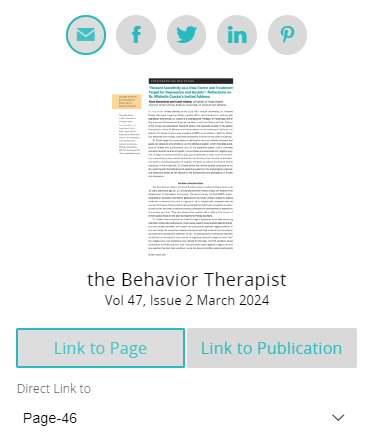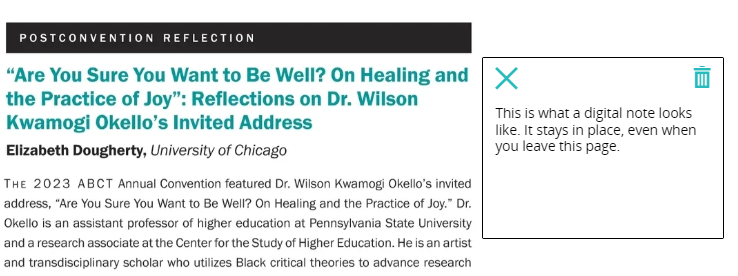Find a CBT Therapist
Search through our directory of local clinicians.
the Behavior Therapist’s March 2024 Issue is Now Live Online

This issue centers on reflections from our 2023 Convention in Seattle, WA. Interested parties can also check out our section on ABCT matters, including the 2023 profiles for Spotlight on a Mentor and Scenes from the 2023 ABCT Awards Ceremony.
There’s all new ways to explore and share tBT through an entirely digital platform:
- Use the hyperlinked titles in the table of contents to go to specific article

Click an article in the table of contents to go directly to that page
- Utilize the search function to find keywords and phrases

Searching for the phrase “Reward Sensitivity” pulls up relevant pages
- Share the your favorite articles or the entire publication through social media, email, and text messages

You can also copy a link directly to the page or publication.
- You can even take digital notes on the pages of the journal.

- When you turn to another page and come back, you’ll notice your note has been collapsed, and is marked by this small square.

Click the square to reopen your note. Notes can be edited and deleted.
You can also access this and previous issues the Behavior Therapist through our tBT journal page. If you’re still interested in a printed copy, you can download the journal as a PDF.
My Account Info
Manage your Membership information, email preferences, and more.
Journals
Membership in ABCT grants you access to three journals.
Convention
We are now accepting Abstract submissions for Continuing Education Ticketed Sessions at the 2024 ABCT Convention in Philadelphia, PA.
My Account Info
Manage your Membership information, email preferences, and more.
Journals
Membership in ABCT grants you access to three journals.
Convention
We are now accepting Abstract submissions for Continuing Education Ticketed Sessions at the 2024 ABCT Convention in Philadelphia, PA.
